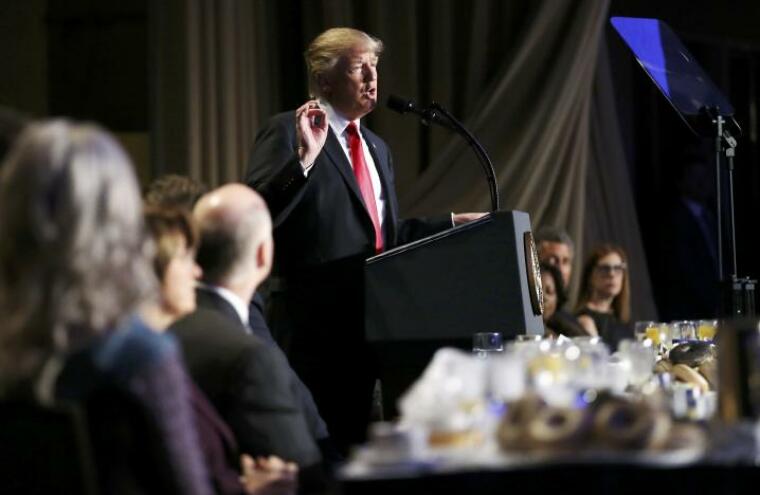Trump reiterates promise to repeal Johnson Amendment

President Donald Trump has reiterated his promise to repeal an IRS rule that bars churches and other tax-exempt institutions from engaging in political activity.
Under the Johnson Amendment, tax-exempt organizations such as churches, charities, and educational institutions could lose their tax-exempt status if they participate in any political campaign in favor or against a political candidate.
In his speech during the National Prayer Breakfast on Thursday, Trump vowed to "destroy" the IRS rule which has been in place since 1954.
"I will get rid of, totally destroy the Johnson Amendment and allow our representatives of faith to speak freely and without fear," he told the guests at gathering.
In an interview with CBN's David Brody last week, Trump described the Johnson Amendment as a "disaster for religion" and said that repealing the rule is a priority of his administration.
Trump's promise to rescind the rule during the campaign period won the support of evangelical leaders, including Liberty University President Jerry Falwell Jr.
Falwell said that eliminating the Johnson Amendment would "create a huge revolution for conservative Christians and for free speech."
Some secularist groups including Americans United for Separation of Church and State have expressed concern over the president's announcement.
"President Donald Trump and his allies in the religious right seek to turn America's houses of worship into miniature political action committees," said the group's executive director, Barry Lynn, according to Reuters.
"It would also lead some houses of worship to focus on supporting candidates in exchange for financial and other aid. That would be a disaster for both churches and politics in America," he added.
A study conducted by LifeWay Research has indicated that most Americans believe that preachers should not endorse candidates in church.
The results of the study revealed that eight in 10 Americans have agreed that it is inappropriate for pastors to endorse candidates during church services while three-quarters said that churches should steer clear of endorsements in general.
However, only 42 percent of Americans agreed that churches should lose their tax-exemption for endorsing a candidate. Fifty-two percent disagreed that churches should be punished for being involved in political campaigns while five percent said they were not sure.
 Christians don't have to affirm transgenderism, but they can’t express that view at work: tribunal
Christians don't have to affirm transgenderism, but they can’t express that view at work: tribunal Archaeology discovery: Medieval Christian prayer beads found on Holy Island
Archaeology discovery: Medieval Christian prayer beads found on Holy Island Presbyterian Church in America votes to leave National Association of Evangelicals
Presbyterian Church in America votes to leave National Association of Evangelicals Over 50 killed in 'vile and satanic' attack at Nigerian church on Pentecost Sunday
Over 50 killed in 'vile and satanic' attack at Nigerian church on Pentecost Sunday Ukrainian Orthodox Church severs ties with Moscow over Patriarch Kirill's support for Putin's war
Ukrainian Orthodox Church severs ties with Moscow over Patriarch Kirill's support for Putin's war Islamic State kills 20 Nigerian Christians as revenge for US airstrike
Islamic State kills 20 Nigerian Christians as revenge for US airstrike Man who served 33 years in prison for murder leads inmates to Christ
Man who served 33 years in prison for murder leads inmates to Christ


 Nigerian student beaten to death, body burned over ‘blasphemous’ WhatsApp message
Nigerian student beaten to death, body burned over ‘blasphemous’ WhatsApp message 'A new low': World reacts after Hong Kong arrests 90-year-old Cardinal Joseph Zen
'A new low': World reacts after Hong Kong arrests 90-year-old Cardinal Joseph Zen Iran sentences Christian man to 10 years in prison for hosting house church worship gathering
Iran sentences Christian man to 10 years in prison for hosting house church worship gathering French Guyana: Pastor shot dead, church set on fire after meeting delegation of Evangelicals
French Guyana: Pastor shot dead, church set on fire after meeting delegation of Evangelicals ‘Talking Jesus’ report finds only 6% of UK adults identify as practicing Christians
‘Talking Jesus’ report finds only 6% of UK adults identify as practicing Christians Mission Eurasia ministry center blown up in Ukraine, hundreds of Bibles destroyed: 'God will provide'
Mission Eurasia ministry center blown up in Ukraine, hundreds of Bibles destroyed: 'God will provide' Church holds service for first time after ISIS desecrated it 8 years ago
Church holds service for first time after ISIS desecrated it 8 years ago Burger King apologizes for 'offensive campaign' using Jesus' words at the Last Supper
Burger King apologizes for 'offensive campaign' using Jesus' words at the Last Supper Uganda: Muslims abduct teacher, burn him inside mosque for praying in Christ’s name
Uganda: Muslims abduct teacher, burn him inside mosque for praying in Christ’s name